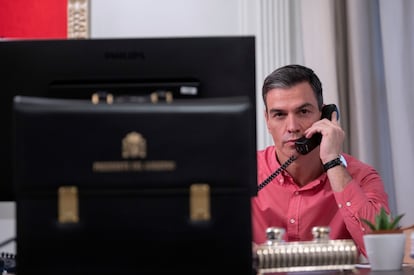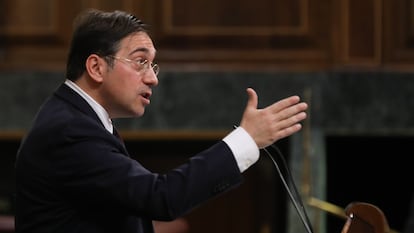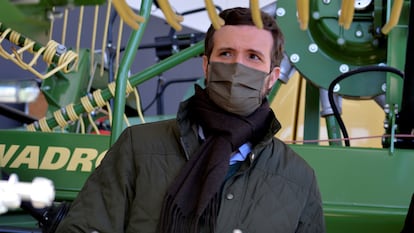Ukraine crisis shakes up domestic politics in Spain, exposing division over NATO plan
Foreign minister to explain government’s position while junior partner Unidas Podemos slams decision to send aircraft and the opposition questions who’s in charge

The Ukraine crisis has entered Spanish domestic politics, showcasing division within the coalition government over Spain’s participation in a North Atlantic Treaty Organization (NATO)-led effort to deter Russia from escalating the conflict further.
Prime Minister Pedro Sánchez of the Socialist Party (PSOE) has run into open objections from his governing partners in the leftist Unidas Podemos, and is instead finding support in the main opposition Popular Party (PP). Party leader Pablo Casado said he backs the government on this issue “as a position of state,” although he also complained that the prime minister has not called him or had a private talk with him in a year and a half. Casado is also using the disagreement between the governing partners to gain political mileage ahead of the upcoming regional election in Castilla y León. “Who’s in charge in your government?” he asked Sánchez on Sunday.
Sánchez spent the weekend intensifying contacts with other global leaders, including NATO secretary general Jens Stoltenberg and European Commission president Ursula von der Leyen. Sánchez reportedly stressed Spain’s commitment to European security and NATO, and Stoltenberg thanked Spain for its “vital contributions” to the alliance’s missions, particularly the recent deployment of the frigate Blas de Lezo. Government sources said that Sánchez was also expecting to speak with Latvia’s president, Arturs Krišjānis Kariņš.
Spain will send four Air Force fighter jets to Bulgaria next month, according to NATO sources. The deployment of a Spanish Air Force contingent to a Bulgarian air base had been approved by the Cabinet on December 21 as part of a wider contribution to NATO, United Nations and EU missions in 2022, but recent events have added a new dimension to the contribution, said government sources.

Foreign Minister José Manuel Albares has asked to appear before the Congress of Deputies to explain Spain’s position on the matter and share the conclusions of an EU meeting due to be held on Monday in Brussels, said ministry sources. Albares is likely to address lawmakers on Tuesday, as the following day he is traveling to Honduras for the inauguration of the new president, Xiomara Castro, and is not due to return before Friday.
On Friday of last week, Albares underscored that the guidelines for Spain’s foreign policy are set by the prime minister and that he himself feels “very comfortable with that.” His remarks came after members of Unidas Podemos openly criticized Spain’s decision to send ships and fighter jets to Eastern Europe as part of NATO’s plan to deter a potential incursion by Russia.
“We are people of peace. We are committed to peace, to deescalating the conflict, to avoiding military exercises in the area, to dialogue and diplomacy,” said Equality Minister Irene Montero, of Unidas Podemos. Spain is “the country of ‘no’ to war,” she added.
And Podemos former secretary general Pablo Iglesias, who served as a deputy prime minister of Spain between January 2020 and March 2021, accused Defense Minister Margarita Robles of treating Spaniards like “idiots” for justifying NATO’s role in the geopolitical crisis. “We have heard the minister of defense say something that PSOE voters do not believe, that NATO was born to defend peace, the LGBTQ+ community, human rights, democracy, public healthcare,” he said.

PP leader Casado, meanwhile, has criticized the mixed messages coming from the coalition partners, and demanded “a clear stand” on the matter of Ukraine. “There is no room for half-measures with such a serious conflict as the one we are experiencing,” he said.
Casado also questioned Sánchez’s leadership, suggesting he should step in to cut the criticism short. “Mr Sánchez, are you going to put your government in order so they’ll stop insulting your defense minister and stop saying that your decisions on Ukraine are nonsense? Who’s in charge in your government, you or [Podemos Deputy PM] Yolanda Díaz? Who’s in charge when it comes to governing Spain, you or Pablo Iglesias?,” he said on Sunday in Villamartín de Campos (Palencia), where he was campaigning for upcoming regional elections in Castilla y León.
This is not the first time that the PSOE and Unidas Podemos openly disagree on a public issue. Recent comments by Consumer Affairs Minister Alberto Garzón about Spanish meat exports drew a frosty reaction from his Socialist partners.
Tu suscripción se está usando en otro dispositivo
¿Quieres añadir otro usuario a tu suscripción?
Si continúas leyendo en este dispositivo, no se podrá leer en el otro.
FlechaTu suscripción se está usando en otro dispositivo y solo puedes acceder a EL PAÍS desde un dispositivo a la vez.
Si quieres compartir tu cuenta, cambia tu suscripción a la modalidad Premium, así podrás añadir otro usuario. Cada uno accederá con su propia cuenta de email, lo que os permitirá personalizar vuestra experiencia en EL PAÍS.
¿Tienes una suscripción de empresa? Accede aquí para contratar más cuentas.
En el caso de no saber quién está usando tu cuenta, te recomendamos cambiar tu contraseña aquí.
Si decides continuar compartiendo tu cuenta, este mensaje se mostrará en tu dispositivo y en el de la otra persona que está usando tu cuenta de forma indefinida, afectando a tu experiencia de lectura. Puedes consultar aquí los términos y condiciones de la suscripción digital.








































